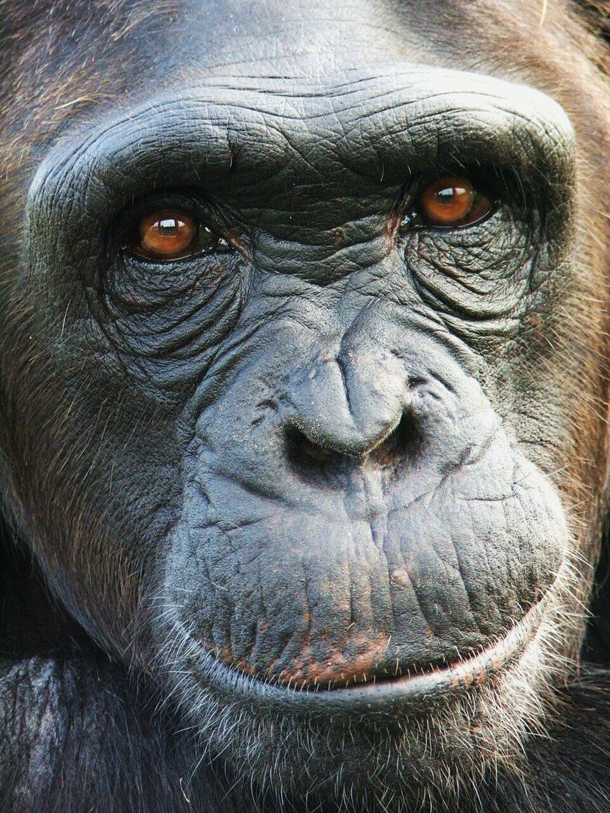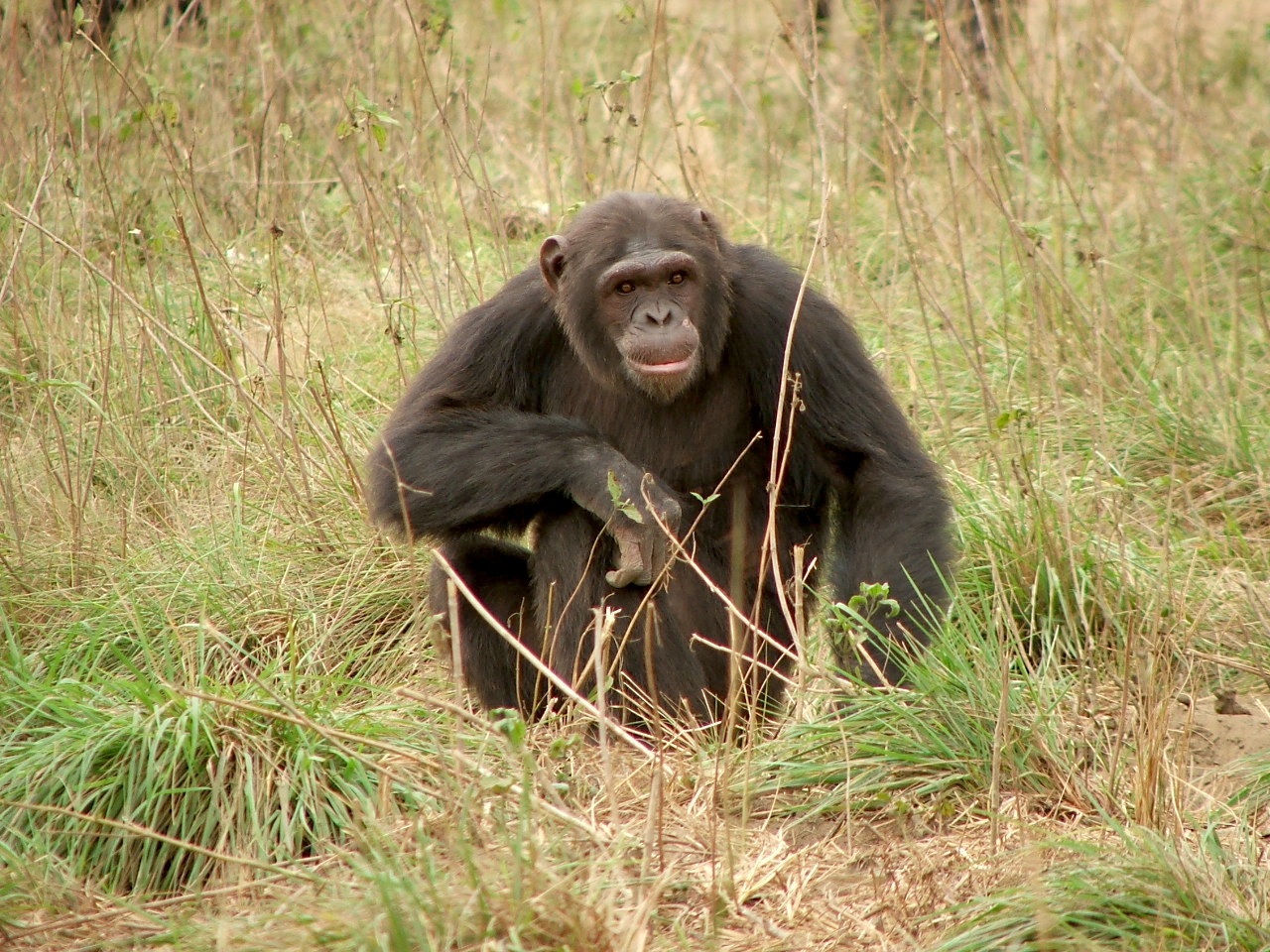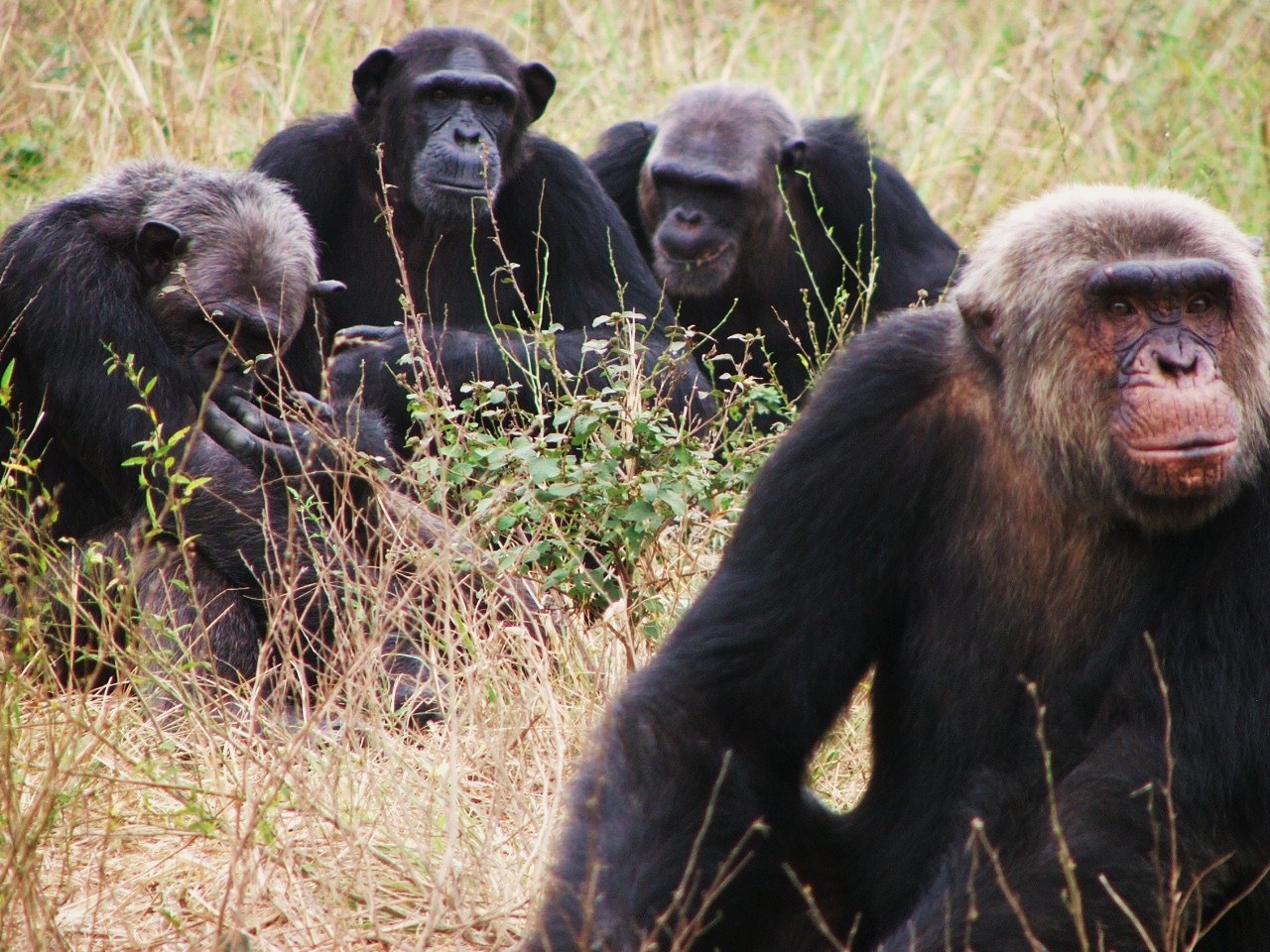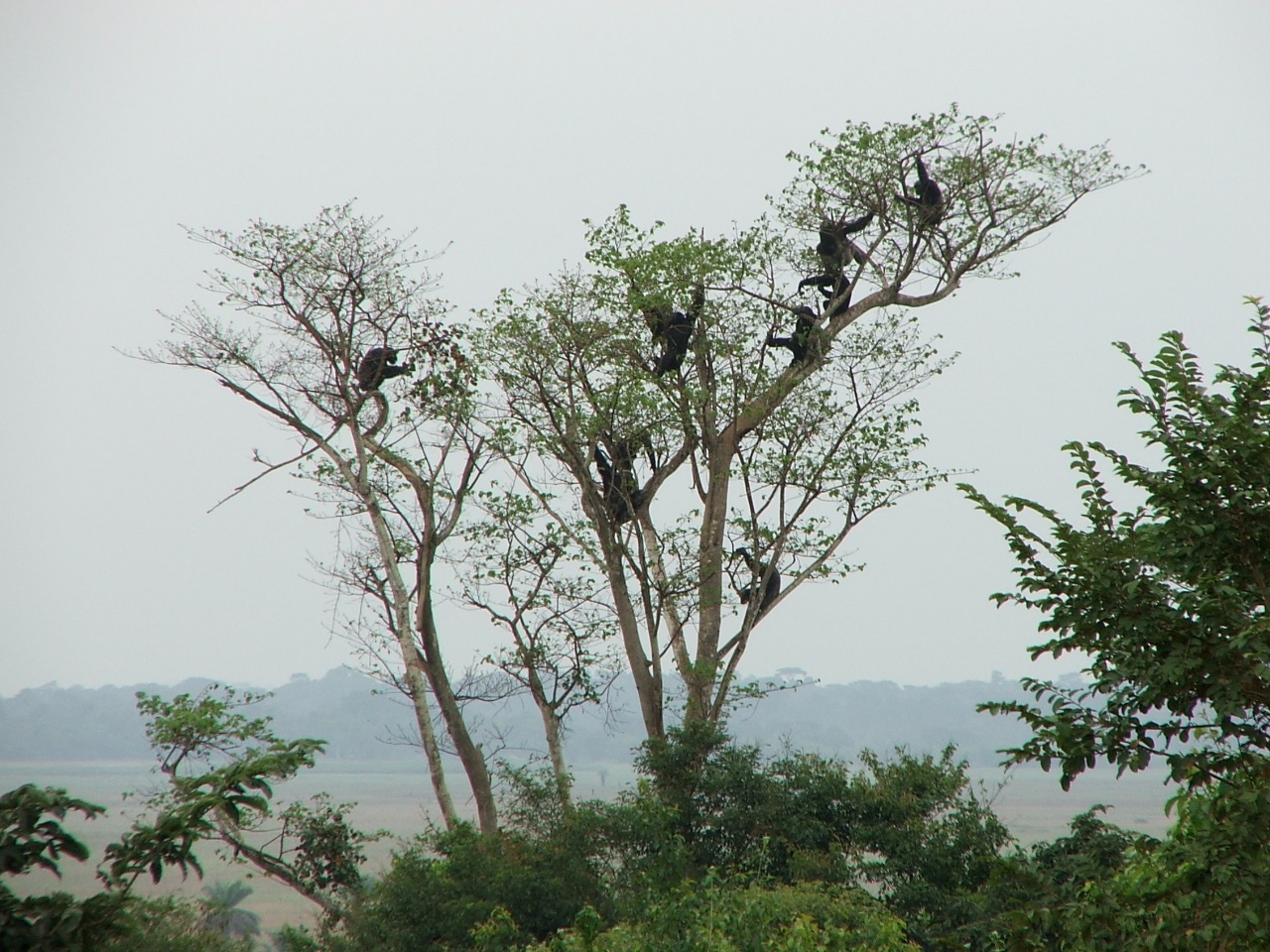Chimps Like To Cook
Air Date: Week of June 12, 2015

Chimpanzees prefer their food cooked, are patient enough to cook it, and understand that a transformation happens during the cooking process. (Photo: Alexandra Rosati)
As well as sharing common ancestors, chimpanzees and humans have other surprising similarities. Host Steve Curwood speaks with Dr. Felix Warneken, Associate Professor of Psychology at Harvard University, about his team’s experiment at a Chimpanzee Rehabilitation Center in the Congo. Their findings suggests that chimps possess several of the skills that allowed early humans to cook food and evolve into homo sapiens.
Transcript
CURWOOD: We humans like to think we're special, but as we learn more about other creatures, the difference between us and some of them becomes harder to pin down. For example, we know that prairie dogs have a surprisingly complex system of communication, and elephants mourn their dead. And, as a team of scientists recently discovered, chimpanzees can cook! Well, sort of. To learn more about this primate talent and what it may tell us about our own evolution, we called up Felix Warneken, Associate Professor of Psychology at Harvard, who conducted the study with his wife, Alexandra Rosati. Felix Warneken, welcome to Living on Earth.
WARNEKEN: Yeah, thanks for having me, Steve.
CURWOOD: So, first of all, what inspired you to do this experiment?
WARNEKEN: The inspiration came from a really provocative hypothesis by a Professor Richard Wrangham who is also at Harvard. And he has written several papers and a whole book, actually, that's called “Catching Fire: How Cooking Made Us Human,” where he shows that cooking is an important aspect of human evolution, because we have these large brains that are metabolically or energetically very expensive. So we somehow have to find the energy to sustain them. And what he proposes is that cooked food will be digested by us more easily, and we can gain more energy from it, and therefore we have much more energy available — that we can use, for example, for sustaining these large brains. So, this was the hypothesis that we started out with, and what my colleague Alexandra Rosati, and I thought was that we can maybe add to this debate about when it was possible for humans to cook their food by studying chimpanzees.
CURWOOD: So of all the primates you could've chosen for the study, why did you pick chimps?

Felix Warnecken and Alexandra Rosati, his wife and colleague, didn’t train the chimps in their experiment to cook. Given a ‘magic cooking device’ they had never seen before, the chimps learned the cooking concept on their own. (Photo: Alexandra Rosati)
WARNEKEN: So, chimpanzees are interesting for studying human evolution because they're one of our closest evolutionary relatives. And so the logic is that, because we're so closely related, that whatever you find in both humans and chimpanzees probably existed already in the common ancestor of humans and chimpanzees, living five to seven million years ago. So this is why we studied chimpanzees — to see to what extent several of what we believe are critical capacities to cook food are already present in these chimpanzees as well.
CURWOOD: Well, I have to tell you, you know, there’s been all this talk about how important it is to eat raw food, so, by the way, I'm really grateful for your study because I can feel more comfortable eating cooked food now!
WARNEKEN: [LAUGHS] That's right. So, I mean, this is what I would highly recommend, reading this book by Richard Wrangham. It's really quite amazing because here he details that there are no humans around that would survive on purely raw, unprocessed food at all. Because we can't extract the energy that we need from it, and that is one major difference — the chimpanzees actually can. So in other terms, we wouldn't be able to sustain on a chimpanzee diets on what chimpanzees in the wild eat on a regular basis. [LAUGHS]
CURWOOD: [LAUGHS] Thank heavens for that. I'm not sure I want to try the chimp diet!
WARNEKEN: [LAUGHS] No, no.

Chimpanzees are more socially aggressive and less cooperative than human beings. This competitive spirit may be one of the reasons chimps never evolved to cook their food. (Photo: Alexandra Rosati)
CURWOOD: [LAUGHS] So, Professor, please walk us through your experiment.
WARNEKEN: Yeah, so what we did is have a whole series of studies to probe chimpanzees’ abilities to cook food. And so what we started out with was asking, what are the kinds of things you have to be able to do in order to cook food? One of the things, is, obviously that you have to be motivated to do it, so we checked that chimpanzees actually prefer their food cooked. So what we did was we focused on white sweet potatoes, because that is something that the chimpanzees that we tested in the center in Africa eat on a regular basis, and they like it. But then we see if they like it even more when it's cooked. And we found, yes, that is the case. If you give them a choice to receive a slice of raw potato versus a slice of cooked potato, they prefer the cooked one.
So that was our first experiment, and then the second issue is that for cooking, obviously, you need more patience, because you could eat the raw version of the food immediately. In order to cook it, however, you have to wait some time. And so that was our second experiment. We tested whether chimpanzees, when they see that they would receive a cooked food, would wait even longer for that, and that was the case as well.

Although we have many differences, chimps also share striking similarities with human beings. 98.8% of their DNA is the same as ours and we share a common ancestor. A new study shows they also use smiling for communication. (Photo: Alexandra Rosati)
And then, when you think further, what else do you have to know and be able to do to cook food is that you have to, somehow, understand, at least on a practical level, that there is this kind of transformation from something raw to something cooked. And so what we did to test this is that we invented this “magic cooking device.” So it's just a bowl, basically, and we showed that when you put a raw slice of potato in it, close it with a lid, shake it, and open it again, it comes out cooked. We use a false bottom to do that, and the reason for doing that was that, first of all, it would've been a bit too dangerous for us to have an actual camping cooker or some other kind of thing in front of these chimpanzees. Imagine them grabbing onto a gas tank — that would not be fun, so that was one reason, just practical. And the other reason is that these chimpanzees may have seen humans using fire to cook food because they live at the center where they see humans all the time. And so, because we're interested in their simultaneous ability to make these inferences, we presented them with this completely novel device that they had never seen before. And so, if chimpanzees understand that, it seems like their understanding goes deeper than just some observation of what they have seen before.
CURWOOD: So they understood that this was a cooking device, it sounds like?
WARNEKEN: That's right. So what they saw was us putting a slice of potato in, and then it comes out cooked, and within minutes, within a single session, when we gave them the choice to receive food after it had been placed and manipulated with this cooking device versus a control device — that was basically a broken cooker that was something that did not change the food that you put into it — they would reliably point to the cooking device, and wanted to receive the food from the cooking device over this control device.
CURWOOD: Now, Professor, I have to ask you at this point — why not just use a microwave for this cooking experiment? I mean, chimps reliably can be trained to push a single button.
WARNEKEN: The simple issue with this is that there's no electricity where we ran our experiments, so putting up a microwave would have been a little bit of a problem, and it also really doesn't fit our luggage that we have to haul over to Africa every summer here from Cambridge. But that is basically what it is, and that would be a really cool study, I agree, to see whether they would do that. I think they would succeed at it, like you say, I think one important aspect is the question to what extent they need to be trained to do it, or they just can figure it out by themselves. But what was so striking to us was that this chimpanzees picked up on these things so quickly.

Chimps aren’t afraid of fire; they’ve actually been known to monitor bush fires in the savanna and eat seeds cooked by the flames. Scientists believe they haven’t mastered fire like humans because, unlike us, chimpanzees don’t pass down a wealth of knowledge from one generation to the next. (Photo: Doug Beckers CC BY-SA 2.0)
So we really didn't train them to do this stuff. We gave the chimpanzees raw slices of potato, and then offered them to put it into this cooking device, or this control device, or just eat it. And then, to our amazement several, of these chimpanzees would actually place the food into this cooking device, they would shake it, open it, and then they would receive the cooked version of it. And it was really surprising to us, because chimpanzees usually eat what they can get. It requires a lot of what is called “inhibitory control” to resist the temptation to just eat something that you hold in your hands, but place it into something so that it turns into something even better.
CURWOOD: So what do you think chimps being able to cook tells us about us?
WARNEKEN: So I think what it tells us is that, at least in principle, our human ancestors possessed several of the abilities that are necessary to cook food. Obviously, chimpanzees do not have all the abilities that are necessary, because chimpanzees in the wild do not actually cook food. So that leads to the question: what are the other things that are necessary? And so, one important thing is the control of fire, that you have to find some way of using that. And chimpanzees do not do that, at least not in the wild, and so this may be one reason why we see this only in the human lineage and not in chimpanzees, cooking. But another reason is maybe more social. Chimpanzees are very competitive over food, and so if you are in a group of individuals competing over food, the best choice for you may be to just eat whatever you have, right, because that lowers the risk of losing it. For humans, early humans, also to cook it maybe required that they were more trusting towards each other, and respecting each other's ownership over food.
CURWOOD: So your studies suggest that we humans aren't all that different from our close relatives?

Warneken and Rosati conducted their experiments in the summer of 2011 at Jane Goodall’s Tchimpounga Chimpanzee Sanctuary in the Republic of Congo. (Photo: Kris Snibbe/Harvard University)
WARNEKEN: Yeah, so what is really striking when you look at this, at the whole field of what is called “comparative psychology,” you find that there is so many things that we previously thought to be unique to humans that have, at least, really striking precursors in chimpanzees. So I think what is apparent on the one hand is we are obviously really different, but then there's so many components that you see already in chimpanzees that indicate to us that maybe it required putting all these components together that made us human, rather than that there's this one single magic thing that is different between humans and chimpanzees that explains all the various differences that we see.
CURWOOD: Felix Warneken is an Associate Professor of Psychology at Harvard University. Thanks so much for taking the time with us today.
WARNEKEN: Yeah, thanks.
Links
Study Published in Proceedings of the Royal Society B
NY Times Book Review of “Catching Fire” by Professor Richard Wrangham
Tchimpounga Chimpanzee Rehabilitation Center
Living on Earth wants to hear from you!
Living on Earth
62 Calef Highway, Suite 212
Lee, NH 03861
Telephone: 617-287-4121
E-mail: comments@loe.org
Newsletter [Click here]
Donate to Living on Earth!
Living on Earth is an independent media program and relies entirely on contributions from listeners and institutions supporting public service. Please donate now to preserve an independent environmental voice.
NewsletterLiving on Earth offers a weekly delivery of the show's rundown to your mailbox. Sign up for our newsletter today!
 Sailors For The Sea: Be the change you want to sea.
Sailors For The Sea: Be the change you want to sea.
 The Grantham Foundation for the Protection of the Environment: Committed to protecting and improving the health of the global environment.
The Grantham Foundation for the Protection of the Environment: Committed to protecting and improving the health of the global environment.
 Contribute to Living on Earth and receive, as our gift to you, an archival print of one of Mark Seth Lender's extraordinary wildlife photographs. Follow the link to see Mark's current collection of photographs.
Contribute to Living on Earth and receive, as our gift to you, an archival print of one of Mark Seth Lender's extraordinary wildlife photographs. Follow the link to see Mark's current collection of photographs.
 Buy a signed copy of Mark Seth Lender's book Smeagull the Seagull & support Living on Earth
Buy a signed copy of Mark Seth Lender's book Smeagull the Seagull & support Living on Earth

